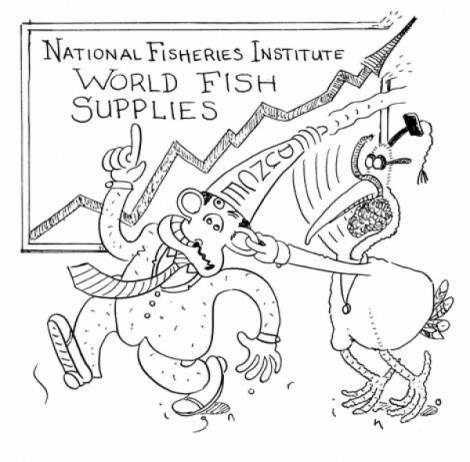Space won’t permit publishing all of your long letter in the print version of this column, Gavin, so I’ll just respond to the excerpts below. A full treatment can be found online at straightdope.com.
First let’s get something straight. You represent the seafood industry. It’s in your organization’s interest to paint a rosy picture of the fisheries. To an extent, your complaint is simply that I put a darker spin on things than you’d like. Accusing me of poor research and grave errors is another matter. I’ve reviewed some of the key scientific papers and consulted with Boris Worm, a fisheries expert at Canada’s Dalhousie University, whose views you claim I’ve misrepresented. As we’ll see, I disagree:
You begin your column [Gavin writes] by reminding readers of the collapse of Atlantic cod, claiming “The number of cod today is something like 1 percent of what it was in the 1960s.” While that is a great rhetorical hook for readers, it is also a dated snapshot of those fisheries. The fact is that the cod stocks (there are two) in Georges Bank and Gulf of Maine are currently rebuilding spawning-stock biomass to target levels.
The two fishing grounds you mention, both in U.S. waters, constitute a relatively small portion of the North American Atlantic cod fishery. The larger part is off the coast of Newfoundland and Labrador; at its peak, it was 10 times the size of the Georges Bank and Gulf of Maine fisheries. The Newfoundland and Labrador fishery collapsed in the early 1990s and fell to less than 1 percent of the peak level. Professor Worm tells me in the past few years, the stock may have risen to about 4 percent— which, OK, is more than the “something like 1 percent” I cited initially—but the offshore fishery remains closed. It would be foolish to call this modest improvement a recovery.
You blame the status of the cod stocks completely on “rapacious factory fishing” while the very latest science on the issue published in the ICES Journal of Marine Science suggests “a relationship between climate change and the decline of bottom species like cod.”
You cite a single paper (Drinkwater, 2005) contending colder waters may have caused cod off Newfoundland to migrate south around the time the fishery there collapsed. Here’s what Professor Worm had to say:
“I don’t think anybody doubts that fishing was the major factor in the collapse of the northern cod fishery. It is true that the collapse happened during a time of cool temperatures, but the fact is that those ‘missing’ fish never turned up again. Stocks south of Newfoundland declined at the same time. Hutchings and Myers published a string of papers in the 1990s clearly showing that fishing was the only viable hypothesis for the collapse.”
The reference to Boris Worm’s 2006 paper [projecting the collapse of all wild fisheries by midcentury] is quite simply out of date-because Worm himself has disavowed the conclusions of his own paper.
No, he hasn’t. I quote Professor Worm: “The assertion that I have ‘disavowed’ my conclusions from 2006 is untrue.
In fact, our new paper confirms independently the trend of increasing species collapse that we highlighted in
2009. What is true is that our new research has also shown that it is indeed possible to curb fishing pressure, and begin a process of rebuilding.” I’ll return to this in a moment.
You suggest that a rash of mislabeling is the result of “dwindling supplies.” Here you show a lack of understanding … Misidentifying fish for sale is about fraud, plain and simple.
That’s a narrow way of looking at it.
As Jennifer L. Jacquet and Daniel Pauly (“Trade Secrets: Mislabeling and Renaming of Seafood,” Marine Policy, 2008) put it: “Species are mislabeled because there is a shortage of the desired species or because the species itself was illegally caught (illegal, because there is a shortage). Species are renamed because an ever-growing demand for seafood creates new markets for fish that were once considered unmarketable (e.g., slimeheads, toothfish). Today’s renaming and mislabeling is not only an indication of cheating, but is, fundamentally, an indication that global fisheries are in distress.”
I don’t claim the situation is hopeless.
Professor Worm’s recent work indicates the situation can be turned around through determined effort. But major reforms are essential, the most obvious in my opinion being a comprehensive, global system of fisheries management. If, instead, we pretend all is well and continue down our present path, we’re sunk.
Send questions to Cecil via straightdope.com or write him c/o Chicago Reader, 11 E. Illinois, Chicago 60611. Subscribe to the Straight Dope podcast at the iTunes Store.
